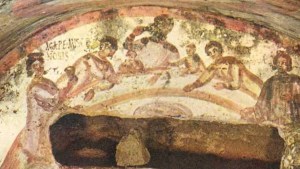Jesus said to his disciples, “Truly, I say to you, unless you turn and become like children, you will never enter the kingdom of heaven” (Matthew 18:3). Unfortunately, we often gloss over that passage, as our experience with children isn’t always pleasant and our memories of being a child remind us of our many mistakes.
However, one way to interpret this passage is to recall how young children are often eager and willing to learn. They want to soak up all the information they can get and ask countless questions (which often annoys many parents and teachers!). Yet, they have a profound capacity to receive knowledge and instruction, which later in life we often reject.
It is a tendency among adults to quit learning at a certain point, and never go any deeper, especially in one’s faith life. We end up trying to solve 65-year-old problems with a faith that has never passed elementary school.
St. Clement of Alexandria wrote extensively on God being a “tutor” or “teacher,” from whom we should eagerly learn the essentials of life. It requires a great deal of humility to go “back to school,” and let God teach us how to live a moral life.
Below is a brief prayer from Clement’s book The Paedagogus that expresses this spirituality of being a student, with Christ as our benevolent teacher. Let us never grow too old to learn and “become like children” in our eagerness to learn about the faith.
Feed us, the children, as sheep. Master, fill us with righteousness. O Instructor, feed us on your holy mountain the Church, which towers aloft, which is above the clouds, which touches heaven. Let us, O children of the good Father — nurslings of the good Instructor — fulfill the Father’s will, listen to the Word, and take on the impress of the truly saving life of our Savior; and meditating on the heavenly mode of life according to which we have been deified, let us anoint ourselves with the perennial immortal bloom of gladness— that ointment of sweet fragrance — having a clear example of immortality in the walk and conversation of the Lord; and following the footsteps of God, to whom alone it belongs to consider, and whose care it is to see to, the way and manner in which the life of men may be made more healthy.

Read more:
Here is what early Christians believed about the Eucharist

Read more:
A blessing for teachers starting a new academic year

